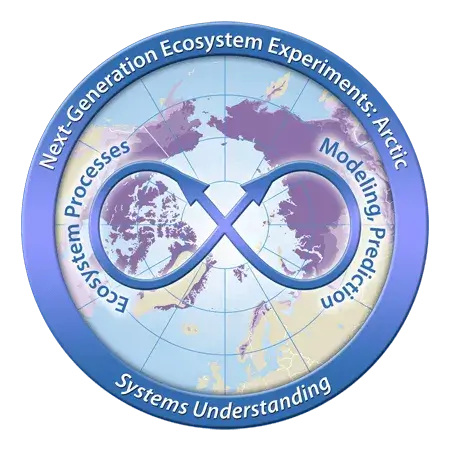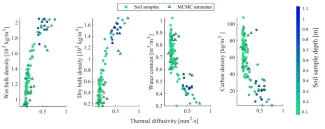Depth-Resolved Profiles of Soil Thermal Diffusivity Estimated from Temperature Time Series
Parameter estimation approach advances cost-effective methodology for estimating soil thermal and physical properties with unprecedented spatial resolution.
Improving the quantification of soil thermal properties is key to achieving better prediction of soil hydro-biogeochemical processes and their responses to changes in atmospheric forcing. Obtaining such information at numerous locations with conventional soil sampling is challenging. The increasing availability of vertically resolved temperature sensor arrays offers promise for improving the estimation of soil thermal properties from temperature time series.
In this study, researchers develop a parameter estimation approach that combines thermal modeling, Bayesian inference, Markov chain Monte Carlo simulation, and sliding time windows to estimate thermal diffusivity and its uncertainty over time, at numerous locations, and at an unprecedented vertical spatial resolution (i.e., down to 5 to 10 cm vertical resolution) from soil temperature time series.
Researchers first assessed under which environmental conditions, temperature sensor characteristics, and deployment geometries soil thermal diffusivity can be reliably inferred. Synthetic experiments show that in the presence of median diurnal fluctuations ≥ 1.5°C at 5 cm below the ground surface, temperature gradients > 2°C m-1, and a sliding time window of at least 4 days, the proposed method provides reliable depth-resolved thermal diffusivity estimates with percentage errors ≤ 10%. Reliable thermal diffusivity under such environmental conditions also requires temperature sensors to be spaced with accuracy to a few millimeters and with a bias defined by a standard deviation ≤ 0.01°C. Researchers then applied the developed approach to field data acquired on the Seward Peninsula, Alaska. Results indicate significant similarity with independent measurements as well as promise in using a sliding time window to estimate temporal changes in soil thermal diffusivity as needed to potentially capture changes in bulk density or water content. These findings represent a critical step in the development of cost-effective methodologies to estimate soil thermal and physical properties at numerous depths and locations.
This study provides a novel approach to infer depth-resolved estimates of soil thermal diffusivity at numerous locations across a watershed. Improving depth-resolved estimates of soil thermal properties is critical as they are strongly associated with the fraction of soil components (including water, organic, mineral, and air) that are key for improving the predictive understanding of water and carbon cycling. Also, the thermal properties modulate soil heat transfer and thus can, for example, accelerate or delay climate change effect on permafrost distribution and associated carbon storage in the Arctic. This study also shows promise in using a sliding time window to estimate temporal changes in soil thermal diffusivity and potentially in bulk density or water content, which both are critical to understand changes in soil, water, and carbon resources. Overall, this research identifies under which environmental conditions and acquisition strategy soil thermal diffusivity can be reliably inferred from temperature time-series, which is critical to guide development of cost-effective methodologies to estimate soil thermal and physical properties at numerous depths and locations.
Brunetti, C., et al. "Probabilistic Estimation of Depth-Resolved Profiles of Soil Thermal Diffusivity from Temperature Time Series." Earth Surface Dynamics 10 (4), 687-704 (2022). https://doi.org/10.5194/esurf-10-687-2022.
This research was supported by the Director, Office of Science, Office of Biological and Environmental Research of the US Department of Energy under Contract No. DE-AC02-05CH11231 as part of the Next-Generation Ecosystem Experiments (NGEE Arctic) project.
For more information, please contact:
Baptiste Dafflon
bdafflon@lbl.gov

